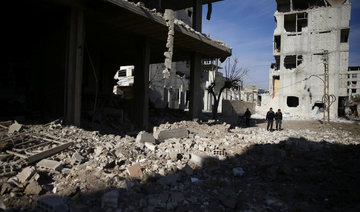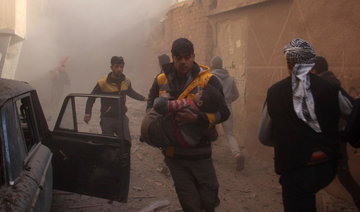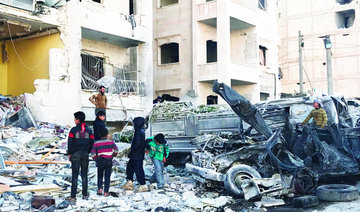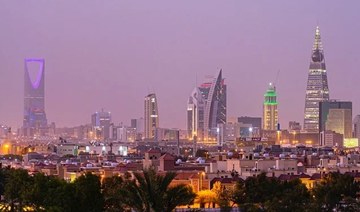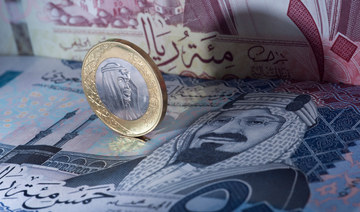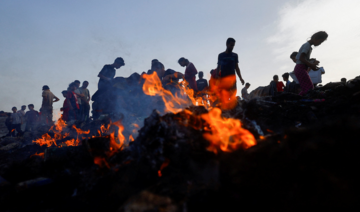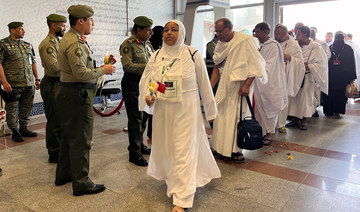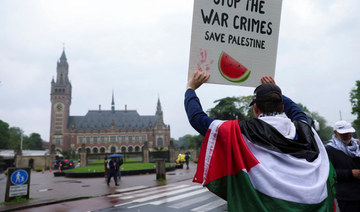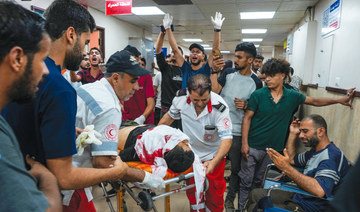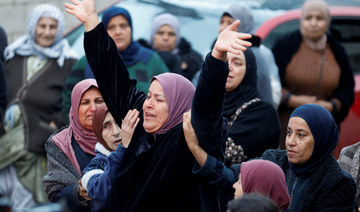BEIRUT: Daesh has been roundly defeated across much of Syria — which made it all the more surprising when it announced an official comeback in the country’s northwest last week.
Syrian regime troops are currently waging a fierce assault against other terrorists and rebels in Idlib province, and in the chaos, Daesh appears to have gained a foothold.
On January 10, Daesh media channels began claiming hit-and-run attacks against Syrian government forces in Idlib, from which the group was ousted in 2014.
Two days later, Daesh officially declared Idlib one of its Islamic “governorates” and has published news of raids against Syrian troops there with increasing pace every day.
Most notably, the organization claims to have killed around two dozen soldiers and taken nearly 20 hostage from an area near the key Abu Duhur military airport in Idlib.
“There are probably hundreds, maybe over 1,000 (Daesh fighters) at most. A number of Daesh guys who fled territory elsewhere made it to this enclave via smuggling,” said Aymenn Al-Tamimi, an academic and expert on the group.
Tamimi told AFP the new Idlib presence was an “extension” of Daesh’s small but established bastion in neighboring Hama province.
More than four years ago, Daesh operated an Islamic “governorate” in Idlib, but it was kicked out of the province in early 2014 by Islamist fighters and allied rebels.
Those fighters went on to oust the regime from the province too, as Daesh extended its Islamic “caliphate” across swathes of Iraq and Syria — but not Idlib.
In Syria, Daesh has since lost almost all that territory to Turkey-backed rebels, US-backed forces, or Syrian army troops.
In December, it made a brief incursion into Idlib for the first time since 2014, but last week’s announcement could signal something more.
So far, it seems Daesh’s territorial grip on Idlib remains limited, with the Syrian Observatory for Human Rights saying it only holds about five villages there.
The Britain-based monitor challenged Daesh’s claims of kidnapping government forces, saying most of the 31 troops captured during the past week in Idlib were held by rival terrorists.
But six were unaccounted for, and Observatory head Rami Abdel Rahman said it was possible, though not confirmed, Daesh was holding them.
“They came out of nowhere, but Daesh was long suspected to have sleeper cells in Idlib,” said Hassan Hassan, a senior fellow at the Tahrir Institute for Middle East Policy.
“I doubt Daesh can get significantly bigger in that area, but this is a big moment for it to build influence and revitalize its cells, some of which will probably remain clandestine,” he said.
A key factor in Daesh’s now-public presence in Idlib, analysts agreed, was the ongoing government offensive against rebels dominated by Hayat Tahrir Al-Sham (HTS) in Idlib.
HTS is led by Al-Qaeda’s one-time franchise in Syria and now rules over a vast majority of Idlib, but the regime’s Russian-backed assault has been chipping away at territory there for several weeks.
Daesh could hardly resist stealing the spotlight, Hassan said.
“Idlib is now a big rebel cause. Everyone is trying to gain popular relevance through their role in defending the area,” he told AFP.
“Such moments are perfect for Daesh to make some noise,” and the group “used the publicity around the offensive to play up its role there.”
Nawar Oliver, an analyst at the Turkey-based Omran Center, suspected Daesh was also trying to take advantage of infighting among Idlib’s rival jihadists to poach hard-liners keen on establishing an Islamic entity.
“With this announcement, extremists in other groups will find a place where they belong,” Oliver said.
“Daesh played this right — they’re saying, I set myself up in Idlib, in the right place at the right time,” he told AFP.
Since war broke out in 2011, Syria has been carved up into complex zones of control held by rebels, Kurdish fighters, pro-regime forces, and competing jihadists including Daesh.
For Charlie Winter, a researcher at King’s College London, it remains “too early” to predict whether IS could make a full-scale comeback across Syria.
“It is battered without manpower, resources, weapons, or the networks to do any strategic offensives like they were able to do in 2014, 2015, and first half of 2016,” he told AFP.
Instead, its proclamation of an Idlib presence was an attempt to say, “we’re still here, knocking around, if we have to pull out from one place we’ll set up somewhere else,” Winter said.
“It can’t have propaganda be about nothing.”
Four years and one caliphate later, Daesh claims Idlib comeback
Four years and one caliphate later, Daesh claims Idlib comeback

EU-Israel relations take a nosedive as Spain, Ireland set to formally recognize a Palestinian state
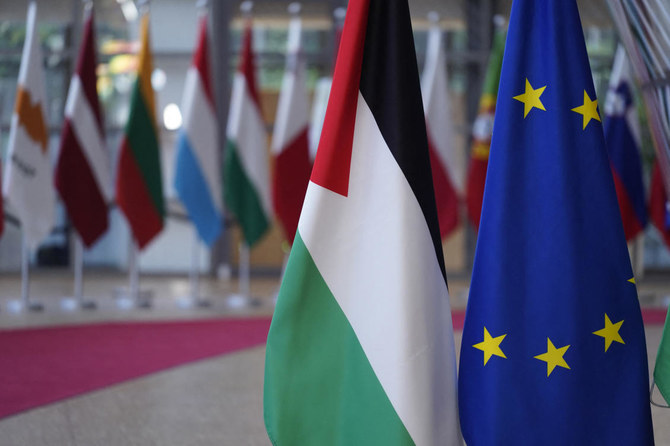
- EU’s foreign policy chief Josep Borrell threw his full weight to support the International Criminal Court
BRUSSELS: Relations between the European Union and Israel took a nosedive on the eve of the diplomatic recognition of a Palestinian state by EU members Ireland and Spain, with Madrid suggesting sanctions should be considered against Israel for its continued attacks in the southern Gaza city of Rafah.
Israeli Foreign Minister Katz told Spain that its consulate in Jerusalem will not be allowed to help Palestinians.
At the same time, the EU’s foreign policy chief Josep Borrell, a Spaniard, threw his full weight to support the International Criminal Court, whose prosecutor is seeking an arrest warrant against Prime Minister Benjamin Netanyahu and others, including the leaders of Hamas.
“The prosecutor of the court has been strongly intimidated and accused of antisemitism,” Borrell said. “The word antisemitic, it’s too heavy. It’s too important.”
Angry words abounded Monday, with Katz accusing Spain of “rewarding terror” by recognizing a Palestinian state, and saying that “the days of the Inquisition are over.” He referred to the infamous Spanish institution started in the 15th century to maintain Roman Catholic orthodoxy that forced Jews and Muslims to flee, convert to Catholicism or, in some instances, face death.
“No one will force us to convert our religion or threaten our existence — those who harm us, we will harm in return,” said Katz.
Even though the EU and its member nations have been steadfast in condemning the Oct. 7 Hamas-led attack in which militants stormed across the Gaza border into Israel, killing 1,200 people and taking some 250 hostage, the bloc has been equally critical of Israel’s ensuing offensive that has killed more than 35,000 Palestinians, according to Gaza’s Health Ministry.
The latest attacks have centered on Rafah, where Palestinian health workers said Israeli airstrikes killed at least 35 people Sunday, hit tents for displaced people and left “numerous” others trapped in flaming debris.
The UN’s top court, the International Court of Justice, on Friday demanded that Israel immediately halt its offensive on Rafah, even if it stopped short of ordering a ceasefire for the Gaza enclave.
“Israel has to stop its offensive in Rafah,” Spanish Foreign Minister José Manuel Albares said.
Spain, Ireland and non-EU member Norway plan to make official their recognition of a Palestinian state on Tuesday. Their joint announcement last week triggered an angry response from Israeli authorities, which summoned the countries’ ambassadors in Tel Aviv to the Israeli Foreign Ministry.
Albares criticized the treatment of the ambassadors. “We reject something that is not within diplomatic courtesy and the customs of the Vienna Convention on Diplomatic Relations,” he said.
“But at the same time we have also agreed that we are not going to fall into any provocation that distances us from our goal,” he added. “Our aim is to recognize the state of Palestine tomorrow, make all possible efforts to achieve a permanent ceasefire as soon as possible and also, in the end, to achieve that definitive peace.”
A bus crashes into vehicles in southern Turkiye, leaving 10 dead and 39 injured
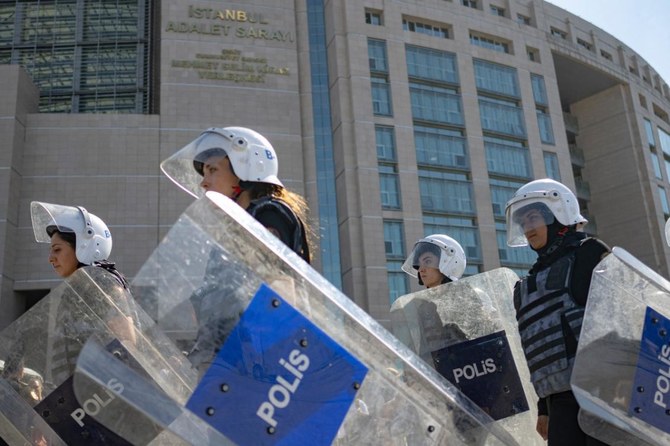
- The injured were rushed to nearby hospitals and at least eight of them were in serious condition
- There were 28 passengers on board the intercity bus, which was traveling from the southeastern city of Diyarbakir to Adana
ANKARA: A passenger bus crashed into vehicles on a highway in southern Turkiye, killing at least 10 people and leaving 39 others injured, officials said Monday.
The accident occurred in the province of Mersin late on Sunday, when the bus veered into the opposite lane in heavy rain and crashed into two cars. A truck later slammed into all three vehicles, Gov. Ali Hamza Pehlivan told reporters.
The injured were rushed to nearby hospitals and at least eight of them were in serious condition, the state-run Anadolu Agency reported.
There were 28 passengers on board the intercity bus, which was traveling from the southeastern city of Diyarbakir to Adana, in the south of the country, Anadolu reported.
Iran’s acting president addresses new parliament
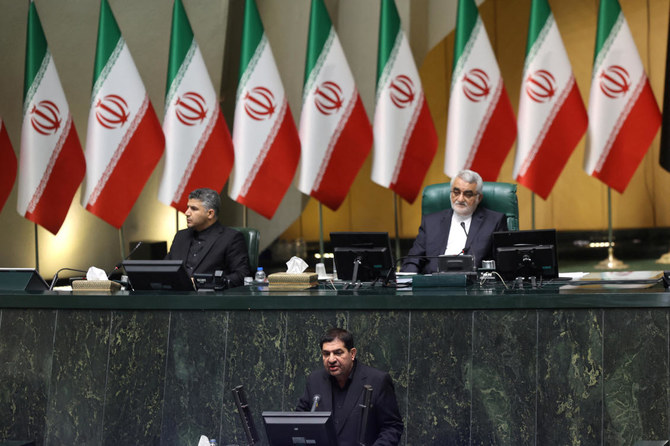
- Mohammad Mokhber’s first public speech since last week’s helicopter crash that killed his predecessor and seven others
- Asserts the country’s economy remains stable when Iran took military actions in Iraq, Israel and Pakistan
TEHRAN: Iran’s acting President Mohammad Mokhber addressed the country’s new parliament Monday in his first public speech since last week’s helicopter crash that killed his predecessor and seven others.
His speech comes as Iran prepares for a presidential election to replace the late Ebrahim Raisi in just a month, a vote that could see the previously behind-the-scenes bureaucrat potentially run alongside others. Meanwhile, Iran’s new hard-line parliament is expected to select its new speaker Tuesday.
In his remarks, Mokhber praised Raisi’s time in office, noting that Iran’s crude oil production— a key source of hard currency for the country — climbed to more than 3.6 million barrels a day. That comes after Oil Minister Javad Owji said Sunday that Iran was now exporting around 2 million barrels a day, despite Western sanctions targeting the Islamic Republic.
Mokhber also asserted that the country’s economy remained stable under Raisi when Iran took military actions in Iraq, Israel and Pakistan in recent months.
“Three countries were hit. We hit Israel, people find that figures and indexes are the same in the morning when they wake up, price of hard currency is the same, inflation is the same, liquidity is the same and the market is full of people’s needs,” Mokhber claimed. “This strength, this settlement and this power is not a usual thing, they all were because of guidance by the supreme leader and the sincere efforts of Ayatollah Raisi.”
The Iranian rial has tumbled from a rate of 32,000 rials to $1 at the time of Tehran’s 2015 nuclear deal with world powers. Today, it stands around 580,000 to $1 in the wake of the US’ unilateral withdrawal from the accord and a series of attacks on shipping in the Mideast, first attributed to Iran and later involving Yemen’s Houthi rebels as Israel’s war against Hamas on the Gaza Strip began over seven months ago.
On May 20, rescuers recovered the bodies of Raisi, Foreign Minister Hossein Amirabdollahian and others in a mountainous region in northwestern Iran following a fatal helicopter crash.
Iran will hold presidential elections on June 28 to replace Raisi. On Thursday, a five-day registration period for candidates will open. Analysts have suggested that Mokhber could be one of those to register.
Meanwhile, Monday marked the first day for Iran’s newly elected parliament, following a March election that saw the country’s lowest turnout since its 1979 Islamic Revolution. Of those elected to the 290-seat body, hard-liners hold over 230 seats, according to an Associated Press survey.
Iran’s parliament plays a secondary role in governing the country, though it can intensify pressure on a presidential administration when deciding on the annual budget and other important bills. Supreme Leader Ayatollah Ali Khamenei, 85, has the final say in all important state matters.
Israel orders Spain to stop consular services for Palestinians from June 1
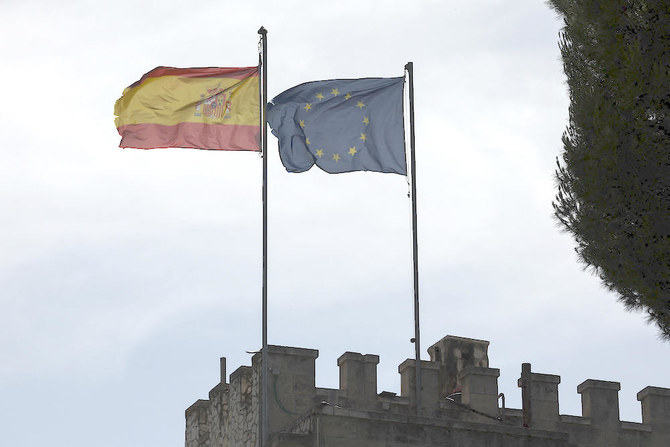
- Israel statement: Spain’s consulate in Jerusalem is ‘authorized to provide consular services to residents of the consular district of Jerusalem only’
JERUSALEM: Israel’s foreign ministry said Monday it had told the Spanish consulate in Jerusalem to stop offering consular services to Palestinians from June 1 over Madrid’s recognition of a Palestinian state.
The ministry said in a statement that Spain’s consulate in Jerusalem is “authorized to provide consular services to residents of the consular district of Jerusalem only, and is not authorized to provide services or perform consular activity vis-a-vis residents of the Palestinian Authority.”
Israel army kills Palestinian teen after West Bank ‘attempted attack’
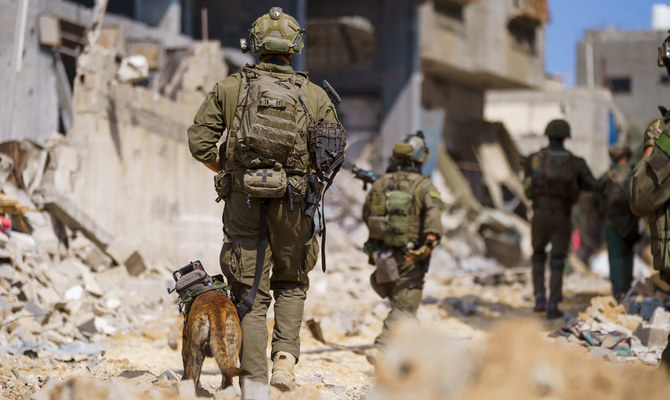
- The deadly incident took place near Hebron in the southern West Bank, the army and the Palestinian ministry said
JERUSALEM: Israel’s military said its troops killed a Palestinian assailant in the occupied West Bank, with the Palestinian health ministry identifying him as a teenager.
Israeli forces “identified a terrorist who came in their direction and attempted to carry out a stabbing attack,” a military statement said.
“The soldiers fired at him and killed him,” it said.
The Palestinian health ministry identified the fatality as Majd Shahir Aramin, 14, and said he had been killed by Israeli forces.
The deadly incident took place near Hebron in the southern West Bank, the army and the Palestinian ministry said.
The West Bank, which Israel has occupied since 1967, has seen a surge in violence for more than a year, but especially since the Israel-Hamas war erupted on October 7.
According to Palestinian officials, at least 519 Palestinians have been killed in the West Bank by Israeli troops or settlers since the start of the war in the Gaza Strip.
Attacks by Palestinians have killed at least 12 Israelis in the West Bank over the same period, according to an AFP tally of Israeli official figures.


